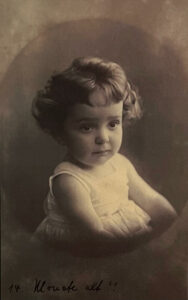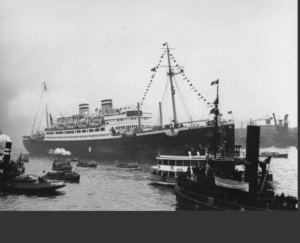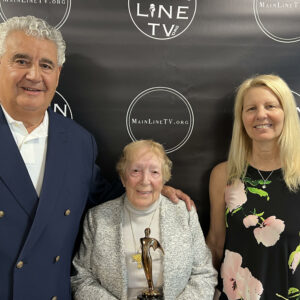Ronnie Breslow was 8 years old when she boarded the MS St. Louis with her mother, Ellie Reutlinger, on May 13, 1939. They planned to meet her father, Gustav Reutlinger, in Cuba, with the ultimate goal of joining a distant cousin in Philadelphia.
Instead, Cuban officials refused to allow the nearly 1,000 Jewish passengers to leave the ship.
Breslow, 92, spoke at the first area screening of a film about her life at the Radnor Memorial Library on June 11. “Escape From Nazi Germany,” a 13-minute documentary by Main Line Television filmmakers Jill Frechie and John Ricciutti. The film won a bronze Telly award in May, the eighth Telly award the duo has garnered.
Breslow was a child when Adolf Hitler came to power in Germany.
“He never hid his disdain for the Jewish minority, even though we were less than 1 percent of the population,” Breslow said. “The vast majority of Germans adored him. There were huge rallies. In 1935 the German Parliament passed the Nuremberg Laws to separate Jews from the German population.”
Her family owned a dry goods store, and there were very few Jews in her hometown, Kirchein. And she was the only Jewish child in her first-grade class.
“After class, the teacher pulled me to her desk and told me I can’t come back to class because I’m a Jew,” said Breslow. Her best friend had not waited for her.

Ronnie Breslow as a child
“When her father came home from work and learned she tried to remain friends with me, he beat her with his belt. She had to promise never to see me again. I was totally isolated.”
Men in Nazi uniforms stood guard in front of her family’s store to keep customers out. The situation for the German Jews was getting worse every day, she said.
“Nov. 9, 1938, the night of the broken glass,” she said. “That night, we Jews lost all of our civil rights. Four hundred synagogues burned to the ground in one night. After Kristallnacht, there wasn’t a Jewish person in Germany who didn’t want to leave. A big problem was where to go. What country will help us?”
Her father had a family Bible with a page in the back with the names and addresses of family members who had immigrated from Germany. He wrote letters. Finally, the distant Philadelphia cousin, Henry Katz, said he would help the family. A former classmate owned a travel agency with one spot on a ship bound for Cuba. So her dad left and then sent for Ronnie and her mother when he obtained papers.
“The fact that he left,” she said. “He was able to get us out.”
When the St. Louis sailed into port in Havana, people cheered.
“I was very excited. I looked over and saw my dad. He was on a little rowboat waving at us,” she said. But when Cuban officials denied the passengers entry, the ship sailed away toward Miami. Captain Gustav Schroder cabled President Franklin Roosevelt, asking permission to bring his 937 Jewish passengers to the U.S. No response. And then he sent another cable, asking if only the 200 or so Jewish children could disembark. Roosevelt again did not answer.
“We passed the Miami coastline so close,” she said.

The St. Louis
(Holocaust Encyclopedia)
The U.S. turned the ship away, as did Canada, and the St. Louis headed back to Europe. England, Belgium, the Netherlands, and France offered the Jewish travelers asylum, but 254 passengers eventually were killed in the Holocaust. Breslow and her mother went to Holland, and after a stay in a detention camp, they ultimately were able to take another ship to New York, where her father met them.
Breslow and her late husband Paul had five children (two deceased), nine grandchildren, and four great-grandchildren. She was a medical technician and helped him with a laboratory business that he owned.
“I realized how exceedingly lucky I am to be in the wonderful country, the U.S.A., where we have our freedoms,” said Breslow. “But I caution all of us to be vigilant so we never lose this precious gift.”
“The Jews are the canaries in the coal mine,” she said. “The problem begins with antisemitism. It never ends there. So that is the danger.”
And Breslow, who lives in Elkins Park, is concerned about the increase in antisemitic incidents. According to the Anti-defamation League (A.D.L.), there were 3,697 incidents in the U.S. in 2022, the highest since 1979. From 2017 to 2021, they rose 36 percent.
“I believe film and television are important media for Holocaust education and awareness,” said Frechie. “As we witness the passing of survivors, we continue to look for ways to keep testimonies alive for future generations to learn from. Hate is not a Jewish problem. It’s a worldwide systemic problem. It is important to note that the Holocaust was not a local issue as one might perceive, the Jewish people had nowhere to go, and that remains a current problem for all people seeking refuge from oppression and abuse.”
Breslow gives talks to students through the Holocaust Awareness Museum and Education Center (HAMEC) in Elkins Park.
Please follow DVJournal on social media: Twitter@DVJournal or Facebook.com/DelawareValleyJournal

